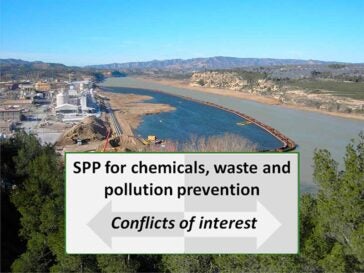 A 2023 publication in Environmental Science & Technology, “Conflicts of Interest in the Assessment of Chemicals, Waste, and Pollution”, co-authored by STEEP Director Rainer Lohmann, was recently selected as the second joint runner-up in the category Feature, Viewpoint, or Perspective in the 2023 Environmental Science & Technology Best Paper Awards.
A 2023 publication in Environmental Science & Technology, “Conflicts of Interest in the Assessment of Chemicals, Waste, and Pollution”, co-authored by STEEP Director Rainer Lohmann, was recently selected as the second joint runner-up in the category Feature, Viewpoint, or Perspective in the 2023 Environmental Science & Technology Best Paper Awards.
Research in this paper focuses on an analysis of conflict of interest (COI), as framed by a 2022 intergovernmental science-policy panel (SPP) on chemicals, waste, and pollution prevention. The SPP’s success would be hindered by conflicts of interest (COI), and the study defined and implications of COI, relevance for chemicals, waste, and pollution management, explored tactics industry has used to exploit doubt or promote misleading information for financial gain, and demonstrated with examples.
According to The Intergovernmental Panel on Climate Change (IPCC), COI “refers to any current professional, financial or other interest which could: i) significantly impair the individual’s objectivity in carrying out his or her duties and responsibilities for the IPCC, or ii) create an unfair advantage for any person or organization.” Also, “circumstances that could lead a reasonable person to question an individual’s objectivity, or whether an unfair advantage has been created, constitute a potential conflict of interest.”
This research reviewed COI aspects of economic gain within for-profit entities, such as the chemical industry, associated industry groups and trade associations (even if registered as not-for-profit organizations), and hired consultants. The study provides examples of “manufactured doubt,” in which organizations question credibility of scientific evidence to safeguard financial gain.
In the case of PFAS, toxicological evidence of cancer-causing perfluorooctanoic acid (PFOA) was brought into question by industry experts with COI, who lobbied for a lower hazard classification from the U.S. National Toxicology Program. Scientific research later prompted the company to stop producing PFOA. Industry positions on the safety of PFAS often ignore the broad scope impacts from manufacturing to disposal.
The analysis looks at other examples of manufactured doubt within the tobacco industry, soft drinks, nuclear power, fossil fuels, pharmaceuticals, pesticides, flame retardants, and endocrine-disrupting chemicals. Evidence reported in the study demonstrates that these industries have attempted to influence policy and regulation established for the safety of human and environmental health.
Conclusively, the analysis recommends that COI follow clear and strict provisions; that conflicts of financial or political gain not be confused with legitimate interests or biases; that regular independent audits occur within SPP work; and in research and authorship, transparency is paramount.
Andreas Schäffer, Ksenia J. Groh, Gabriel Sigmund, David Azoulay, Thomas Backhaus, Michael G. Bertram, Bethanie Carney Almroth, Ian T. Cousins, Alex T. Ford, Joan O. Grimalt, Yago Guida, Maria C. Hansson, Yunsun Jeong, Rainer Lohmann, David Michaels, Leonie Mueller, Jane Muncke, Gunilla Öberg, Marcos A. Orellana, Edmond Sanganyado, Ralf Bernhard Schäfer, Ishmail Sheriff, Ryan C. Sullivan, Noriyuki Suzuki, Laura N. Vandenberg, Marta Venier, Penny Vlahos, Martin Wagner, Fang Wang, Mengjiao Wang, Anna Soehl, Marlene Ågerstrand, Miriam L. Diamond, and Martin Scheringer. Conflicts of Interest in the Assessment of Chemicals, Waste, and Pollution. Environmental Science & Technology 2023 57 (48), 19066-19077.

